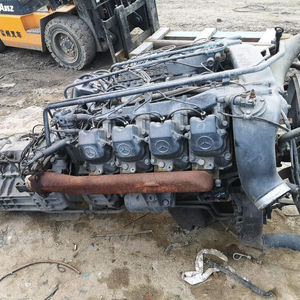Import Engines: Everything You Need to Know Before Getting
Import Engines: Everything You Need to Know Before Getting
Blog Article
An Extensive Contrast of Different Kinds Of Import Engines and Their Applications in Different Vehicles
From the effectiveness of turbocharged engines to the ecological kindness of electric powertrains, the spectrum of import engines readily available in today's market caters to a wide array of driving requirements and choices. Whether it's the torque of a diesel engine or the unique design of a rotary engine, comprehending the nuances of each type and exactly how they straighten with particular car requirements can considerably affect performance, gas economy, and overall driving experience.
Turbocharged Engines
Turbocharged engines, understood for their ability to improve power output efficiently, have become increasingly widespread in modern lorry styles. By making use of exhaust gases to drive a wind turbine that presses inbound air right into the engine, turbochargers efficiently increase the quantity of air and gas blend that can be ignited, leading to improved efficiency without substantially boosting engine size. This technology permits producers to downsize engines, causing much better gas effectiveness while keeping power degrees equivalent to bigger, normally aspirated engines.

Hybrid Engines
With the innovations in engine modern technology assisting in improved performance and performance, the automobile sector has actually seen a rise in the integration of hybrid engines as a sustainable solution for power shipment. Crossbreed engines integrate the advantages of both interior combustion engines and electrical motors to supply enhanced fuel efficiency and lowered emissions. By perfectly switching in between both power resources or utilizing them at the same time, hybrid engines offer versatility in various driving problems.

Furthermore, hybrid technology is not limited to a details lorry type, with applications varying from small sedans to larger SUVs and even high-performance cars. As ecological concerns and fuel efficiency laws come to be increasingly prominent, hybrid engines stand for a significant action towards sustainable transport services.
Electric Engines
Electric engines have changed the vehicle market with their environmentally-friendly and efficient power shipment systems. import engines. These engines run by transforming electrical energy into power, using a silent and smooth driving experience. Unlike typical combustion engines, electrical engines generate absolutely no tailpipe exhausts, decreasing the overall carbon footprint of lorries and assisting combat air contamination
One of the essential benefits of electric engines is their high energy effectiveness, generally converting over 80% of the electrical power right into propulsion. This performance converts right into cost savings for consumers via decreased gas expenditures. Furthermore, electrical engines require less maintenance contrasted to interior combustion engines, as they have less moving components that can break in time.
Electric engines are generally made use of in electric cars (EVs) and hybrid electrical vehicles (HEVs) On the other hand, HEVs combine electrical engines with traditional inner burning engines to maximize fuel performance and minimize discharges.
Diesel Motor
Diesel motor are renowned for their remarkable gas efficiency and durable performance try this web-site in a variety of automotive applications. These engines run by compressing air in the cyndrical tubes, which brings about heats that spark the infused gasoline without the demand for trigger plugs. This burning approach provides diesel engines with higher torque outputs compared to gas engines, making them perfect for heavy-duty automobiles like trucks, buses, and construction tools.
Among the key advantages of diesel engines is their exceptional fuel efficiency, as they can take a trip farther on a gallon of fuel compared to gasoline engines. This effectiveness is especially helpful for long-haul transportation and commercial fleets, where minimizing gas costs is a considerable factor. Furthermore, diesel engines are recognized for their longevity and long life, requiring less upkeep over their lifespan compared to fuel engines.
Over the last few years, developments in diesel motor innovation have actually additionally concentrated on lowering discharges to satisfy strict environmental laws. Modern diesel engines are geared up with innovative exhausts control systems, such as diesel particle filters and careful catalytic decrease, which help reduce pollutants released into the ambience - import engines. These developments have made diesel motors cleaner and much more eco-friendly while preserving their effectiveness and efficiency qualities
Rotary Engines
Prominent for their distinct design and efficiency moved here qualities, rotating engines offer a distinctive option to conventional burning engine technologies like diesel engines. These engines, also known as Wankel engines, operate on a various principle contrasted to conventional piston engines.

Conclusion
Finally, the comparison of various kinds of import engines highlights the diversity of alternatives available for numerous cars. Turbocharged engines provide raised power and efficiency, hybrid engines integrate electric and standard power resources for enhanced gas economic situation, electrical engines provide a clean and sustainable option, diesel engines are known for their resilience and torque, and rotating engines supply a special design with possibility for high efficiency. Each engine type has its own strengths and applications in the automobile market.
In addition, hybrid engines add to a quieter driving experience and commonly provide a smoother acceleration contrasted to typical inner combustion engines.
Distinguished for their unique style and performance qualities, rotary engines supply a distinct option to conventional combustion engine innovations like diesel engines. These engines, also known as Wankel engines, run on a different concept contrasted to standard piston engines. In spite of these constraints, rotating engines continue to bring in lovers additional resources and manufacturers looking for a different engine innovation with distinctive benefits.
Turbocharged engines offer boosted power and effectiveness, hybrid engines combine conventional and electric power sources for boosted fuel economy, electric engines offer a clean and lasting choice, diesel engines are known for their resilience and torque, and rotary engines supply a special layout with potential for high performance.
Report this page